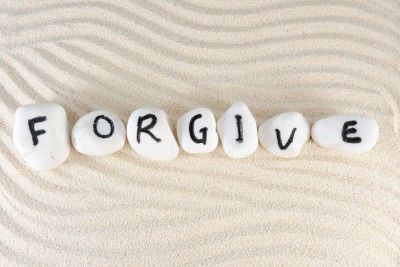
I’m a big advocate of that controversial F-Word. You know the one, right? The three syllables that creep into the vocabulary of everyone enduring relationship (or any other) turmoil: forgiveness.
There are those divorcees who strive to affirm The F-Word with heartfelt conviction. They view it as a release, something that will ease their pain, and therefore they make it a goal in their journey.
Yet, there is no shortage of divorced/divorcing individuals who claim to have no use for The F-Word. They insist they are above it. They claim that their ex, no matter what he says or does, will never deserve the gift inherent in that word.
What a powerful arrangement of letters!
When I hear the word “forgiveness,” I often recall a generic playground where two children have escalated a conflict to the point where adult intervention is necessary.
“Say you’re sorry,” a wise adult instructs.
The wrongful child complies, and the wronged child accepts. There may or may not be a handshake or a hug to seal the deal, and then the two friends happily skip away to play a new game.
The playground scenario is familiar to many, and it leaves us with a lasting impression of what forgiveness means. After several painful broken hearts and years of study and self-reflection, I’ve come to the conclusion that the child-minded idea of forgiveness is an illusion that simply doesn’t work in our grown-up scenarios. Case in point: everything that has anything to do with divorce.
Just like “fun” means different things to children and adults, forgiveness does too. When we become adults, it’s important to let go of the simplistic ideas behind this monumental and courageous act…
Forgiveness isn’t a free pass. Nothing can erase the deed that was done. Forgiving someone doesn’t signify that you find agreement with what s/he did, but rather that you’ve come to a place of acceptance. Essentially, the forgiver lets go with the understanding that the forgivee is living through the karma s/he created.
Forgiveness isn’t forgetting. See above. Forgiving doesn’t mean you’ve turned a blind eye to the painful event. On the contrary, part of the process involves recalling and reflecting in order to set appropriate boundaries as you move forward.
Forgiveness isn’t friendship. Forgiveness can involve re-establishing a connection, but more importantly it’s about severance. Letting go of the anger around an incident doesn’t mean you have to welcome the perpetrator into your life. Boundaries are important, especially when dealing with someone who has a history of causing harm.
And, most importantly…
Forgiveness isn’t for them. It doesn’t have to be requested. It doesn’t even have to be discussed. If we wait for someone to ask for forgiveness, we continue to give that individual the power to imprison us in pain. In his book, Complaint-Free Relationships, Will Bowen states, “Forgiveness is for giving.” The act has very little to do with the one who is forgiven and everything to do with the emotional evolution of the person who was initially wronged.
Forgiveness isn’t easy, but it becomes a more likely reality when we let go of our childish perspective. At its core, forgiveness is about acceptance and release; handshakes and hugs are optional.

Leave a Reply